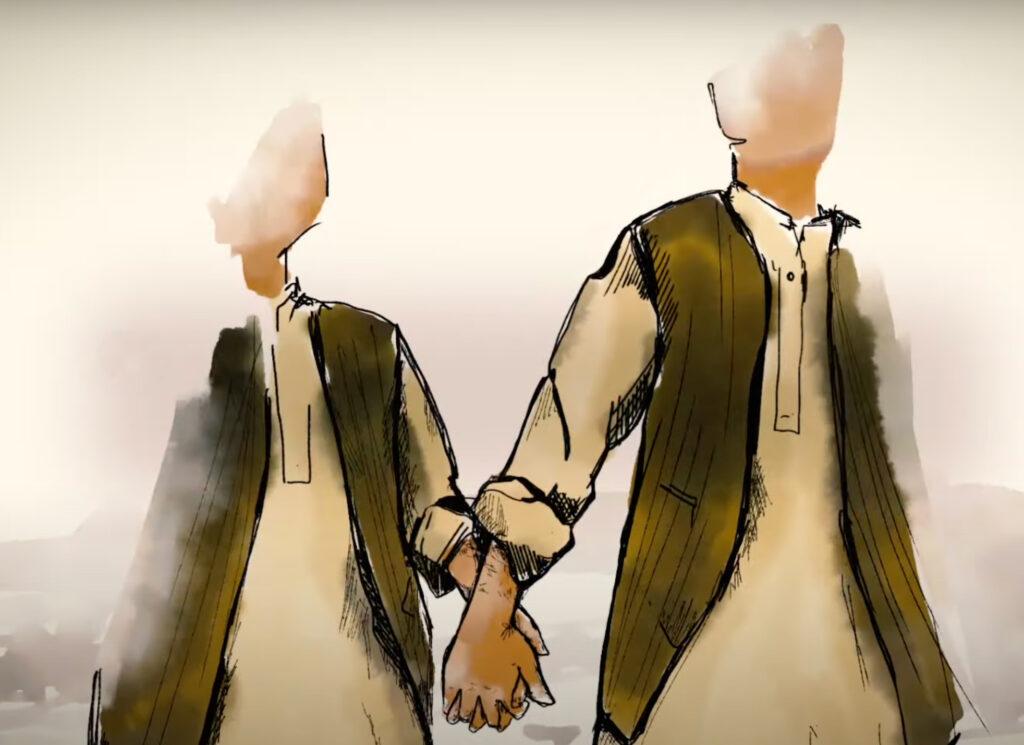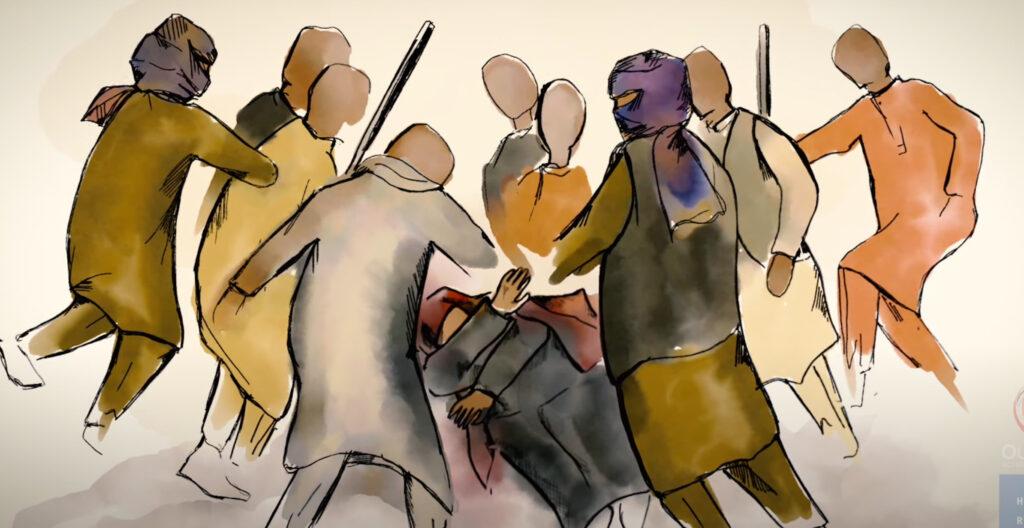LGBTQ Afghans who fled from the Taliban are stuck in Pakistan
Colin Stewart is a 45-year journalism veteran living in Southern…
Few LGBTQ refugees find a new life abroad
LGBTQ Afghans who fled their nation to escape from the repressive Taliban regime now live in fear of death if they go back home, but face long odds of moving beyond Pakistan and finding sanctuary in a country that protects their queer community.
This is an edited, abridged version of an article published in VoicePK:
LGBTQ Afghan migrants in limbo

By Nadeem Khan
At just 22 years of age, Danish has seen and experienced far more than anyone would want to in a lifetime.
“Back in Kabul, there were plenty of people around me who knew that I’m gay,” he says. “The Taliban’s promotion of virtue and prevention of vice police were routing out LGBTQ persons. To the regime, we’re not only anti-religion but we’re also agents of the West because of our networks with ally groups through which we were able to access safe havens during the Republic era.”
The first time he fled his home country, he found work at a bakery in Iran’s capital, Tehran. Within two months, however, he along with many other Afghan refugees were deported by Iran’s security forces and sent to the Afghan border town of Islam Qala.
According to a United Nations High Commissioner for Refugees (UNHCR) border monitoring report, an estimated 45,500 undocumented Afghans were deported from Iran through the Islam Qala and Zaranj crossing points between 1 and 30 April, amounting to an average of 1,516 people every day.
In his second attempt, he once again traveled to Iran and remained there for a three-month transit stay before attempting to illegally cross over to Turkey. He was arrested and allegedly tortured in custody by the Iranian border security for two weeks before he was handed over to the Taliban via the border at Nimruz.
For his third (and so far final) attempt, Danish made way for Pakistan, entering Chaman from Kandahar. He has since taken up residence in Quetta where, due to his status as an undocumented ‘alien’, he makes a living as a sex worker. A bold risk to take in a society in many ways as conservative as that of Afghanistan.
Danish’s life back home:
“My mother died after giving birth to me so it was just my father and I. When the Taliban took over Afghanistan, they abducted him. I don’t know where he is. My partner also fled to Germany,” he relates, and the loneliness coaxes a strangled sob from his throat. “I’m suffocating here. I don’t know how I’ll end up.”
Afghanistan’s deeply religious and patriarchal society does not tolerate homosexuality. Although protection and security for the LGBTQ community were absent even in the Republic era, there was enough space for queer folk to be able to live secret lives.
Under the Taliban regime and its aggressive interpretation of Sharia, sexual nonconformity is a criminal offense that can be charged with severe penalties.

The country’s queer community is not the only casualty. Taliban leadership has barred girls from attaining secondary and higher education, and women from holding any sort of job. A great many Republic employees, social and civil rights activists, journalists as well as LGBTQ Afghans have been forced to flee for their survival.
UNHCR states that as of June 2022, the number of Afghan refugees and asylum-seekers in neighboring countries is estimated at 2.1 million. As of March 2023, Pakistan is hosting approximately 1.37 million refugees and asylum-seekers, most of whom are of Afghan origin.
“UNHCR in coordination with the Government of Pakistan to create a plan for refugees. Furthermore, UNHCR tries its level best to keep them settled as many of them face life threats back at home,” says Qaiser Afridi, spokesperson for UNHCR Pakistan.
Earlier, Amnesty International expressed concern over the arrest and imprisonment of Afghan refugees, including women and children, in Karachi. Upon publication of this statement, the detained migrants were deported back to Afghanistan.
Few LGBTQ refugees find a new life abroad
Only 19 out of the 3,175 applicants received by UNHCR have been successfully resettled in Australia, Canada and the U.S.
“UNHCR is in sustained dialogue with host countries to increase the number of migrants,” Afridi states.
The trauma of fleeing almost certain death, the hardships that accompany statelessness and an agonizingly slow process to finally reach a safe haven have deeply scarred Afghan LGBTQ, both at home and in Pakistan.
Ahmed, 24, and his 25-year-old partner split for their own safety after the fall of Kabul. He was among the relatively lucky ones who procured a visa during the Republic era, and was able to cross into Pakistan via the Torkham border. He is now residing with relatives in Peshawar.
“When the Taliban took over, it was suddenly impossible to live the way I had before. No one is safe, no one has the right to be comfortable with and celebrate who they are. What liberties can the LGBTQ community have over there?” he posits.
But where he is now does not guarantee his complete freedom. Tribal and religious customs still have a stronghold in Peshawar, and so Ahmed must also stay low-key so as to not arouse suspicions as to his sexuality.
Human Rights Watch (HRW) has also expressed concerns over the state of the LGBTQ community in a 43-page report based on 60 interviews. The same reports an interview with the German tabloid Bild, where a Taliban judge stated that “For homosexuals, there can only be two punishments: either stoning, or he must stand behind a wall that will fall down on him.”
‘There is no future for us’
Naimatullah Sadat, who leads an Afghan LGBTQ organization called Roshania or “Enlightened”, is devastated by the political, social and economic upheaval of Afghanistan under the Taliban.
“There is no future for us under them. Our community is desperate for refuge in countries where there are LGBTQ-friendly laws, but our applications are not being prioritized,” he laments, explaining that of the 1,500 applications received and forwarded by Roshiana, only 170 were able to secure asylum. Hundreds others had to be urgently relocated to Iran and Pakistan for their safety.
Maryam, 24, is among those LGBTQ members still trapped in Afghanistan. Residing in Kabul, she had means to support herself through work at a local market. After August 15, 2021, she lost not just her job but any chance of ever taking up work and earning a living. Unlike so many others, she was unable to migrate to Pakistan due to circumstances in her own life making it dangerous for her to make the journey.
Maryam is actually from a village where her family still resides. But there is no safety to be had there – the whole community knows of her sexual orientation, and one of her uncles is also a member of the Taliban. She currently lives in a rented basement apartment in Kabul and is seriously considering marrying a man in order to avoid being outed a lesbian.
“I can’t go back to my village because they’ll surely kill me,” she says. “I used to live somewhere else in Kabul, but my uncle found my whereabouts. I’m alive today because I moved as quickly as I could. My new home is literally underground. I can’t even get out anymore.”
Maryam had a partner who fled to her hometown Herat. They are no longer in contact, suspicious of even online applications due to past incidents where the Taliban’s spy networks were able to trace and arrest several NGO workers. She has managed to survive so far on donations from friends.
Names in this story have been altered due to privacy and security concerns.




